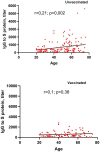Impact of QazVac vaccination on clinical manifestations and immune responses in post-COVID syndrome: a cross-sectional study
- PMID: 40206472
- PMCID: PMC11978623
- DOI: 10.3389/fmed.2025.1556623
Impact of QazVac vaccination on clinical manifestations and immune responses in post-COVID syndrome: a cross-sectional study
Abstract
Introduction: Post-COVID syndrome, also known as long COVID, has emerged as a major public health concern, affecting a substantial proportion of individuals recovering from SARS-CoV-2 infection. This condition is characterized by persistent symptoms lasting at least 2 months after acute infection, significantly impacting quality of life and increasing healthcare burdens. In Kazakhstan, the recognition of post- COVID syndrome in national clinical protocols highlights the need for effective prevention and management strategies. Vaccination has been suggested as a key intervention to reduce the severity and prevalence of long COVID symptoms, yet data on its effectiveness, particularly for the domestic QazVac vaccine, remain limited. The aim of this study is to investigate the impact of vaccination with the domestic QazVac vaccine on the features of humoral and cellular immunity in patients with post-COVID conditions and to identify the leading clinical variants of the course.
Methods: We analyzed data from 90 vaccinated and 217 non-vaccinated patients, examining sex, age, smoking status, BMI, comorbidities, and clinical manifestations.
Results: There were no significant differences between the groups with regard to sex, age, and smoking status. However, the characteristics of the subjects indicated that vaccination was correlated with a lower prevalence of diabetes mellitus (2.2% vs. 11.1%, p = 0.011) and cardiovascular diseases (0.0% vs. 10.1%, p = 0.047), and a higher prevalence of hypertension among non-vaccinated subjects. With regard to clinical symptoms, vaccinated individuals presented a significantly decreased frequency of neurological (51.1% vs. 74.2%, p = 0.001), gastrointestinal (4.4% vs. 15.2%, p = 0.008), respiratory (21.1% vs. 36.4%, p = 0.009), rheumatological symptoms (26.7% vs. 38.7%, p = 0.044), and kidney symptoms (2.2% vs. 9.7%, p = 0.024). In contrast, unvaccinated participants had more memory loss (49.8% vs. 22.2%, p < 0.001), depression (31.3% vs. 6.7%, p < 0.001), joint pain (33.2% vs. 14.4%, p = 0.001), and other psychopathological symptoms.
Discussion: A sharp decrease in the frequency of neurological, gastrointestinal, respiratory, and rheumatological symptoms was recorded in vaccinated patients, advocating for the protective role of vaccination against long COVID-19 sequelae. These findings highlight the potential for vaccination to mitigate the burden of post-COVID complications across various organ systems.
Keywords: QazVac vaccine; cellular immune response; flow cytometry; immunoglobulin G; post-COVID-19 condition.
Copyright © 2025 Madenbayeva, Kurmangaliyeva, Urazayeva, Kurmangaliyev, Bazargaliyev and Kudabayeva.
Conflict of interest statement
The authors declare that the research was conducted in the absence of any commercial or financial relationships that could be construed as a potential conflict of interest.
Figures







References
-
- Kurmangaliyeva SS, Urazayeva ST, Bazargaliyev YS, Kudabayeva KI, Kurmangaliyev KB, Balmagambetova SK, et al. Risk factors associated with Long COVID-19: a narrative review. West Kazakhstan Med J. (2024) 2024:239–54. doi: 10.18502/wkmj.v66i3.16572 - DOI
LinkOut - more resources
Full Text Sources
Miscellaneous

